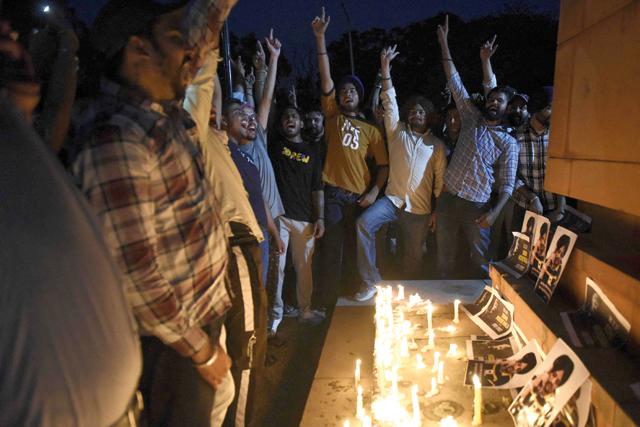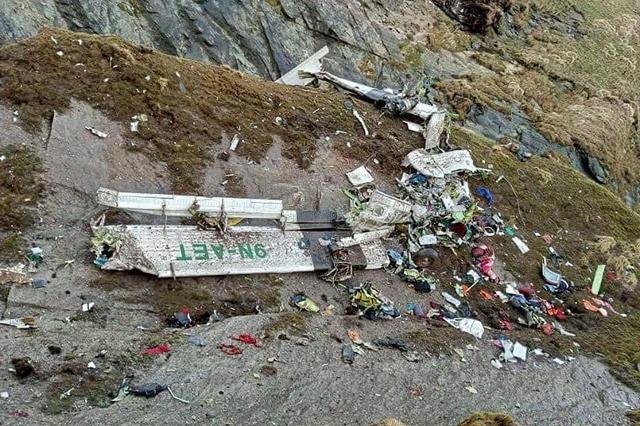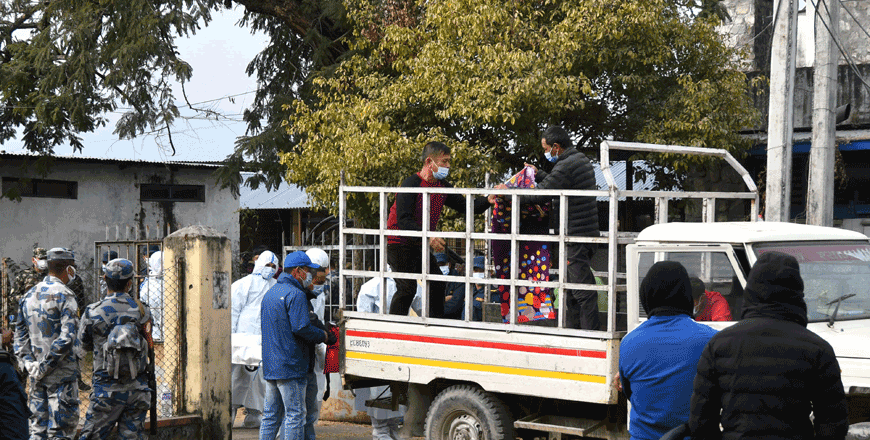You are here
All 22 bodies retrieved from Nepal plane crash
By AFP - May 31,2022 - Last updated at May 31,2022

Members of Nepal’s security personnel carry the body of a victim of Twin Otter aircraft, operated by Tara Air that crashed earlier in the Himalayas, at the airport in Kathmandu, on Tuesday (AFP photo)
POKHARA, Nepal — Nepali rescuers have retrieved all 22 bodies from a plane that crashed in the Himalayas, authorities said on Tuesday.
Air traffic control lost contact with the Twin Otter shortly after it took off from Pokhara in western Nepal on Sunday morning and headed for Jomsom, a popular trekking destination.
Its wreckage was found a day later, strewn across a mountainside at an altitude of around 4,400 metres.
“All 22 bodies have been carried to Kathmandu by Nepal Army’s [Mi-17] helicopter,” Tribhuvan International Airport spokesman Teknath Sitoula told AFP.
“After postmortem, they will hand over the dead bodies to their family members.”
About 60 people were involved in the search mission, including the army, police, mountain guides and locals, most of whom trekked uphill for miles to get there.
Many spent the night camped at the high-altitude site.
The chief of Nepal’s Civil Aviation Authority, Pradeep Adhikari, said the government had formed a committee to investigate the accident.
“Our pilots fly in very challenging terrains and in unpredictable weather. We are looking into what can be done to minimise such accidents, especially in monsoon and pre-monsoon periods,” Adhikari said.
The cause of the crash is yet to be confirmed, but Pokhara Airport spokesman Dev Raj Subedi said on Monday that the aircraft, operated by Nepali carrier Tara Air, did not catch fire in the air.
The flight data recorder and the cockpit voice recorder have also been recovered from the crash site, Sitoula said Tuesday.
There were 16 Nepalis, four Indians and two Germans on the twin-prop aircraft.
The Germans, in their 50s, were heading for a two-week trek in the remote Upper Mustang area with their Nepali guide.
Poor safety record
According to the Aviation Safety Network website, the aircraft was made by Canada’s de Havilland and first flew more than 40 years ago.
Its operator Tara Air is a subsidiary of Yeti Airlines, a privately owned domestic carrier that services many remote destinations across Nepal.
It suffered its last fatal accident in 2016 on the same route when a plane with 23 on board crashed into a mountainside.
An investigation concluded that the crew repeatedly entered clouds and descended despite unfavourable weather conditions and warnings, and also deviated from their route.
Nepal’s air industry has boomed in recent years, carrying goods and people between hard-to-reach areas as well as foreign trekkers and climbers.
But it has been plagued by poor safety due to insufficient training and maintenance.
The European Union has banned all Nepali carriers from its airspace over safety concerns.
The Himalayan country also has some of the world’s most remote and tricky runways, flanked by snow-capped peaks with approaches that pose a challenge even for accomplished pilots.
The weather can also change quickly in the mountains, creating treacherous flying conditions.
In March 2018, a US-Bangla Airlines plane crash-landed near Kathmandu’s notoriously difficult international airport, killing 51 people and seriously injuring 20.
That accident was Nepal’s deadliest since 1992, when all 167 people aboard a Pakistan International Airlines plane died when it crashed on approach to Kathmandu.
Just two months earlier, a Thai Airways aircraft had crashed near the same airport, killing 113 people.
Related Articles
POKHARA, Nepa — Nepali rescuers on Monday retrieved 16 bodies from the mangled wreckage of a passenger plane strewn across a mountainside th
POKHARA, Nepal — Nepali rescue workers scoured a debris-strewn ravine on Monday for more bodies from the mangled wreckage of a plane with 72
POKHARA, Nepal — Nepali hospital staff began the grim task of handing over bodies to grieving families on Tuesday after a plane with 72 peop














